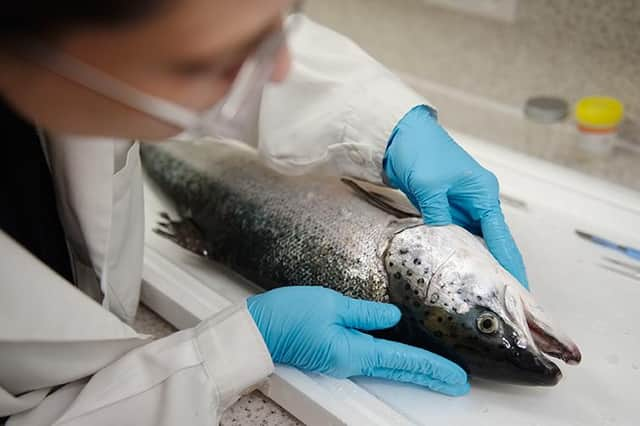Scottish aquaculture sector to gain from research programme led by University of the West of Scotland


A research programme being led by the University of the West of Scotland (UWS) and backed by a number of industry players is working on a monitoring system to help seafood producers identify health concerns and take pre-emptive action.
The method – similar to approaches used in human and veterinary medicine – involves regular analysis of biomarkers such as mineral or electrolyte levels in blood samples.
Advertisement
Hide AdAdvertisement
Hide AdThe project was recently awarded a significant funding package as part of the UK Seafood Innovation Fund, with support from the Scottish Aquaculture Innovation Centre (SAIC).
Businesses including The Scottish Salmon Company, Scottish Sea Farms, Mowi, Cooke Aquaculture, Loch Duart, Wester Ross Fisheries, Grieg Seafood and Kames Fish Farming are also supporting the research.
The UWS team is planning to set up a company in a year or so to harness the research through Scottish Enterprise’s high-growth spin-out programme.
The new tool could dramatically improve the speed and efficiency of the health monitoring process at fish farms.
As part of the project, researchers are now running tests on thousands of samples to develop a digital database that will allow future blood samples to be cross-referenced against a set of biomarkers that represent normal conditions.
Brian Quinn, professor of ecotoxicology at the UWS’s aquaculture health laboratory, said: “This type of proactive approach might seem a no-brainer, given that it’s already used widely in human medicine and agriculture.
“However, it’s a very complex process and we’re just scratching the surface when it comes to developing the system for fish health.”
Quinn said the project has received a “great deal of support” from the industry as companies recognise the potential impact and benefits.
Advertisement
Hide AdAdvertisement
Hide Ad“The system could trigger a fundamental change in fish farming’s approach to health management, based on proactive, informed interventions – it’s the first time we’ve been in a position to offer this,” he added.
Polly Douglas, aquaculture innovation manager at the Stirling-based SAIC, said: “Enhancing fish health and wellbeing continues to be one of the biggest priorities for the sector in Scotland. It’s great to be helping to facilitate partnerships between academia and the industry that can find new, more efficient methods for monitoring and diagnosis. When it comes to complex projects, collaboration is key to success.”
A message from the Editor:
Thank you for reading this story on our website. While I have your attention, I also have an important request to make of you.
With the coronavirus lockdown having a major impact on many of our advertisers - and consequently the revenue we receive - we are more reliant than ever on you taking out a digital subscription.
Subscribe to scotsman.com and enjoy unlimited access to Scottish news and information online and on our app. With a digital subscription, you can read more than 5 articles, see fewer ads, enjoy faster load times, and get access to exclusive newsletters and content. Visit https://www.scotsman.com/subscriptions now to sign up.
Our journalism costs money and we rely on advertising, print and digital revenues to help to support them. By supporting us, we are able to support you in providing trusted, fact-checked content for this website.
Frank O'Donnell
Editorial Director
Comments
Want to join the conversation? Please or to comment on this article.